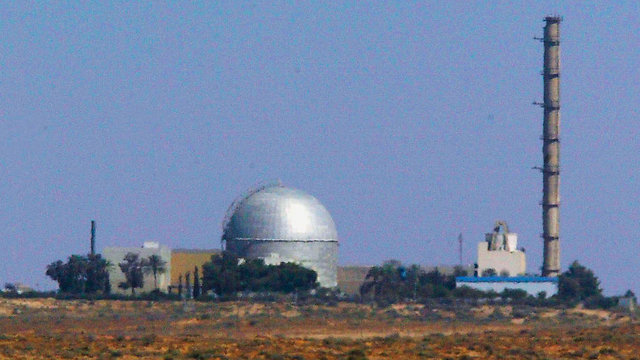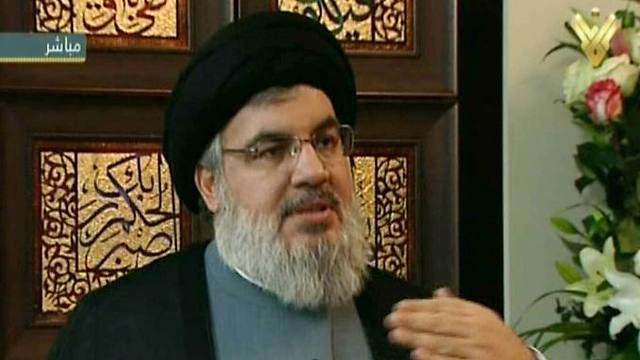Why is Nasrallah speaking in public?
Analysis: Hezbollah's secretary general has been speaking in public for two reasons: He owes many explanations to the Lebanese public and he fears Israel may carry out a preemptive strike against his military infrastructure
Hezbollah Secretary General Hassan Nasrallah has spoken in public frequently of late.
He has delivered a number of speeches and yesterday granted a live interview to the Lebanese TV station Al-Mayadeen. Our many years covering Nasrallah have taught us that he leaves his hiding place to speak for two reasons: He either feels that he owes an explanation to his supporters and the Lebanese people, or he has a fear and wants to dissuade his enemies from realizing that fear.
Currently, Nasrallah owes many explanations to the Lebanese people, especially concerning Hezbollah casualties in the Syrian Civil War, the Arab League's branding of Hezbollah as a terrorist group, and the suspension of Saudi Arabia's $4 billion of aid to Lebanon.
More than 1,300 Hezbollah casualties have angered not only Shi'ite families and Hezbollah supporters, but also the broader Lebanese public. Nasrallah has emphasized that he is the protector of Lebanon, but his critics blame him and his organization for bringing the Syrian Civil War into Lebanese territory.
Therefore, in his interview yesterday, Nasrallah stressed that his organization has the ability to launch precision-guided missiles at major targets in Israel. This threat against Israel defeated not only his critics in Lebanon, but also in the Sunni Arab world.
Yesterday he told his critics in the Arab world: I do not belong to a terror group that kills Arabs; I am leading the battle to protect Lebanon and fighting the Zionist entity. Nasrallah also tried to calm the Lebanese people. He said Israel will not wage a war, and told the Lebanese not to worry. He then added that in the Second Lebanon War, Israel entered the war because of an error that he made and assured that it will not repeated.
Making a secret weapon a boomerang
Nasrallah's message to Israel was more complex. The Hezbollah leader consumes Israeli media compulsively and his speeches and interviews clearly demonstrate that he reads every word we publish. Sometimes he even expresses his own conclusions that are not included in the original text.He decided to give yesterday's interview as a result of Israeli reports and security officials' statements about the need to deliver a preemptive strike on Lebanon before Hezbollah fires its more than 100,000 rocket and missile arsenal on us.
Nasrallah reads and sees the Israeli reports about the IDF building an obstacle on the Lebanese border. The IDF has said publicly that the obstacle is meant to make it more difficult for Hezbollah to send its special forces across the border into Israel in the next war.
Nasrallah sees the quick erection of the obstacle as reinforcing what he reads in the Israeli press. He fears that Israel will hit his military infrastructure in Lebanon and so has threatened to hit "nuclear and biological sites" in Israel. Basically, Nasrallah said yesterday: With my precision-guided missiles, I can turn your secret weapon into a boomerang that will hit you.
Even if you inflict a preemptive blow or destroy Lebanon and take it back 50 years, says Nasrallah, you cannot stop me from turning your strategic facilities into a double-edged sword that will be turned against you. Nasrallah is very concerned and he is trying to use the Israeli public to pressure the government not to embark on a preemptive war or inflict a disproportionate blow on Lebanon should there be a war. In short, Nasrallah is attempting to deter us and is eve saying so openly.
Another reason for the threatening speech is that Nasrallah was very encouraged by the ratings he got for his “ammonia speech” from a few weeks ago. It was Nasrallah who invented the term “cobwebs” to describe anxiety he observes among Israelis in the face of casualties and destruction in the civilian sector. Nasrallah has since seen that Israeli society is not exactly a cobweb, but he believes, apparently pretty correctly, that Israeli society is highly sensitive to casualties, and so continues to harp on this.
The alarmed reaction among the Israeli public and media towards his previous speech, in which he threatened to kill half a million Israelis by bombing the ammonium plant in Haifa Bay, made him think he was on to something. Yesterday he sought to repeat his success, but it looks like this time he was a bit disappointed.
A gimmick that is used too many times loses its effectiveness, although – one must admit – Nasrallah is an artist in the war of the mind, and he conducts it like a chess master playing several opponents simultaneously on separate boards. To his home audience, he makes excuses for the war in Lebanon and the condemnation by the Sunni Arab camp. To Israel, he sends messages whose purpose is to deter the IDF and scare us, the citizens, along the way. One day, the statements will likely be put to the test, and it’s possible that Nasrallah will no longer be present at the end of that day to give any speeches.
Nasrallah cannot follow through on a large portion of his threats. He has no capability to precisely target most Israeli strategic sites, and the sites he threatens are so fortified that even a direct hit would cause no damage. So the threat is mostly empty, but it must not be underestimated.












